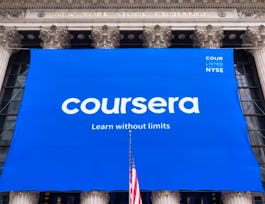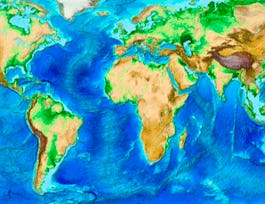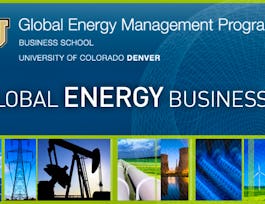This course is designed to introduce students to the issues of energy in the 21st century – including food and fuels – which are inseparably linked – and will discuss energy production and utilization from the biology, engineering, economics, climate science, and social science perspectives.


Our Energy Future
Taught in English
Some content may not be translated
67,689 already enrolled
(1,151 reviews)
Skills you'll gain
Details to know

Add to your LinkedIn profile
7 quizzes
See how employees at top companies are mastering in-demand skills


Earn a career certificate
Add this credential to your LinkedIn profile, resume, or CV
Share it on social media and in your performance review

There are 10 modules in this course
Course overview materials, including syllabus, lecturer information, grading criteria, and external notices and resources.
What's included
7 readings
Introduces the basics of energy, covers finite energy sources like petroleum, looks at how energy and food are related, and examines the scale of current and future energy consumption and what renewable energy options can meet that demand.
What's included
10 videos5 readings1 quiz
Looks at some of the alternative energy options from the physical sciences domain, including wind energy, photovoltaic and photothermal energy, and nuclear energy. It also covers energy storage and electric vehicles, and energy efficiency and smart grid technologies.
What's included
12 videos6 readings1 quiz1 peer review
Provides an overview of the different biological energy sources including plants and algae. It explains what biofuels are, how they are produced, and the pros and cons of different biological sources.
What's included
2 videos1 reading
Discusses various plant-based fuels including corn ethanol, cellulosic ethanol, and jatropha biodiesel. It will cover the different technologies used, the pros and cons of each source, and current production around the world.
What's included
6 videos3 readings1 quiz
Examines different algae used for biofuel production including cyanobacteria, diatoms, and green algae. It looks at how these organisms are different and why they are used to produce biofuels and bio-products. Additionally, the module covers the different tools and technologies used in research and production including bio-prospecting, genetics, synthetic biology, and metabolic engineering.
What's included
9 videos5 readings1 quiz
Covers the chemistry of biodiesel, looks at the different thermochemical processes used to convert biomass to fuel, and examines renewable biogas. It also looks at the production process of algae biofuel, how and why nutrient utilization and recycling is important in biofuel production, and the relationship between biofuel and water.
What's included
11 videos6 readings1 quiz
Examines how energy production and use affects the economy, our wellbeing, and our heath. It will also look at how energy impacts the poorest communities, the external costs of traditional energy, and how we can regulate energy and incentivize renewable energy. Additionally, this section identifies what a Life Cyle Assessment is and how it is used with renewable and non-renewable fuels. Lastly, it looks at the United States’ past and present energy policies, and the current state of international policy on climate change.
What's included
16 videos7 readings1 quiz1 peer review
Looks at the history of research on how carbon dioxide causes climate change, the key points of the Intergovernmental Panel on Climate Change’s reporting, and how climate change is portrayed in the media. Also, it discusses the importance of decreasing Short-lived Climate Pollutants (SLCPs) to mitigate climate change and some possible solutions to reduce these pollutants produced by the poorest communities. Additionally, this section looks at how climate change has affected California’s water and energy use, and how climate change threatens global food security.
What's included
8 videos4 readings1 quiz
Recordings of live office hours from Dr. Mayfield and other course lecturers.
What's included
10 videos
Instructor

Offered by
Recommended if you're interested in Environmental Science and Sustainability

Coursera Project Network

Coursera Project Network

University of Illinois at Urbana-Champaign

University of Colorado System
Why people choose Coursera for their career




Learner reviews
Showing 3 of 1151
1,151 reviews
- 5 stars
79.73%
- 4 stars
16.60%
- 3 stars
2.26%
- 2 stars
0.34%
- 1 star
1.04%

Open new doors with Coursera Plus
Unlimited access to 7,000+ world-class courses, hands-on projects, and job-ready certificate programs - all included in your subscription
Advance your career with an online degree
Earn a degree from world-class universities - 100% online
Join over 3,400 global companies that choose Coursera for Business
Upskill your employees to excel in the digital economy
Frequently asked questions
Access to lectures and assignments depends on your type of enrollment. If you take a course in audit mode, you will be able to see most course materials for free. To access graded assignments and to earn a Certificate, you will need to purchase the Certificate experience, during or after your audit. If you don't see the audit option:
The course may not offer an audit option. You can try a Free Trial instead, or apply for Financial Aid.
The course may offer 'Full Course, No Certificate' instead. This option lets you see all course materials, submit required assessments, and get a final grade. This also means that you will not be able to purchase a Certificate experience.
When you purchase a Certificate you get access to all course materials, including graded assignments. Upon completing the course, your electronic Certificate will be added to your Accomplishments page - from there, you can print your Certificate or add it to your LinkedIn profile. If you only want to read and view the course content, you can audit the course for free.
You will be eligible for a full refund until two weeks after your payment date, or (for courses that have just launched) until two weeks after the first session of the course begins, whichever is later. You cannot receive a refund once you’ve earned a Course Certificate, even if you complete the course within the two-week refund period. See our full refund policy.


